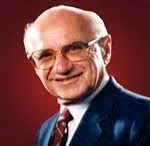Monetarists view currency as another product subjected to the laws of supply and demand. They conclude that government intervention in the economy distorts the market price for currency, thereby exasperating economic cycles.

Milton Friedman, the man associated with monetarism. He blinds you with science. And his bald patch.
On the other hand, Keynesian economists view currency as a tool that governments may use to influence supply and demand. Government intervention in the economy is thus justified to address social issues by influencing levels of inflation or unemployment statistics, among other hardships. Yet there are more obscure economic theories out there. One such a theory is Coase's Theorem.

John Maynard Keynes, the biggest economist of the last century. In more ways than one.
Definition of Coase's Theorem
If there are no transaction costs, the efficient outcome will occur regardless of the initial property rights.
Coase's theorem seems to me especially applicable to South Africa's land redistribution policies, which has seen some very inefficient outcomes like a drastic drop in agricultural production and having South Africa become a net importer of food. The inefficient outcomes are not based on lack of skill, but rather on lack of certainty with regards to property rights.
It appears that government wants to stimulate growth and nurture black ownership of farms on the one hand, while simultaneously not offering reasonable prices for farms. The result of such a situation is lack of investment and commitment on the side of the farmers - both current owners and new owners. This is perfectly understandable, especially with the threats of nationalisation and land appropriation (they'd call it theft if they had the balls) coming from the ANCYL.
In turn, the net result of such a situation is increased transaction costs and lower agricultural production. A transaction cost is a cost associated with making an exchange. It's the cost of doing business, which could prevent economic efficiency.
What is economic efficiency?
Economic efficiency refers to a situation whereby the most goods and services are provided with the least amount of resources. Naturally, transaction costs and externalities would have to be kept to a minimum to facilitate efficiency.
The redistribution of wealth is essential, we are told, to address the imbalances of Apartheid South Africa. But what if it were absolutely justifiable, but did not lead to the desired outcome? Should we not stop and question policies before we enforce them? Perhaps the road to hell is indeed paved with good intentions, and perhaps one such golden intention is the redistribution of wealth?
Should we not address transaction costs?
Coase's theorem explicitly states that initial property rights are inconsequential if one desires economic efficiency. The best course of action to me seems to be to work towards decreasing transaction costs instead of plotting nationalisation and land grabs. We all know what happened to Zimbabwe. As a developing nation, surely we'd like to compete with India, Brazil and China instead of losing our position as the economic powerhouse of Africa?


No comments:
Post a Comment